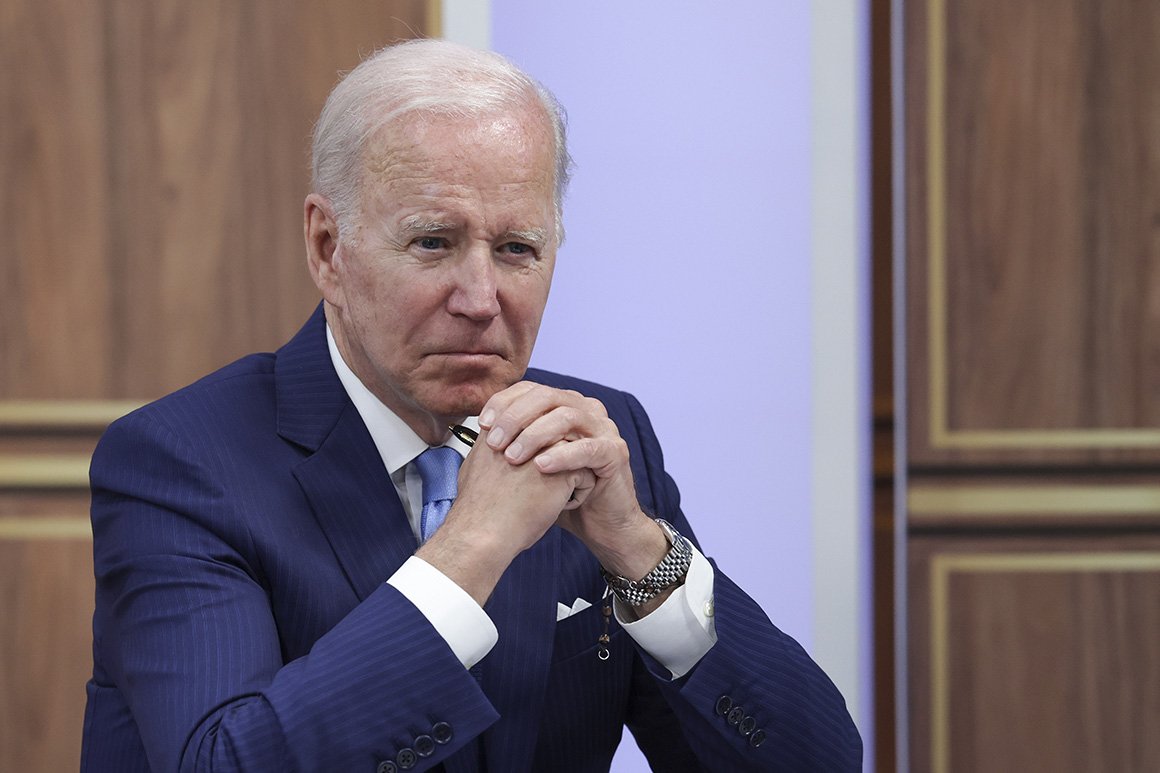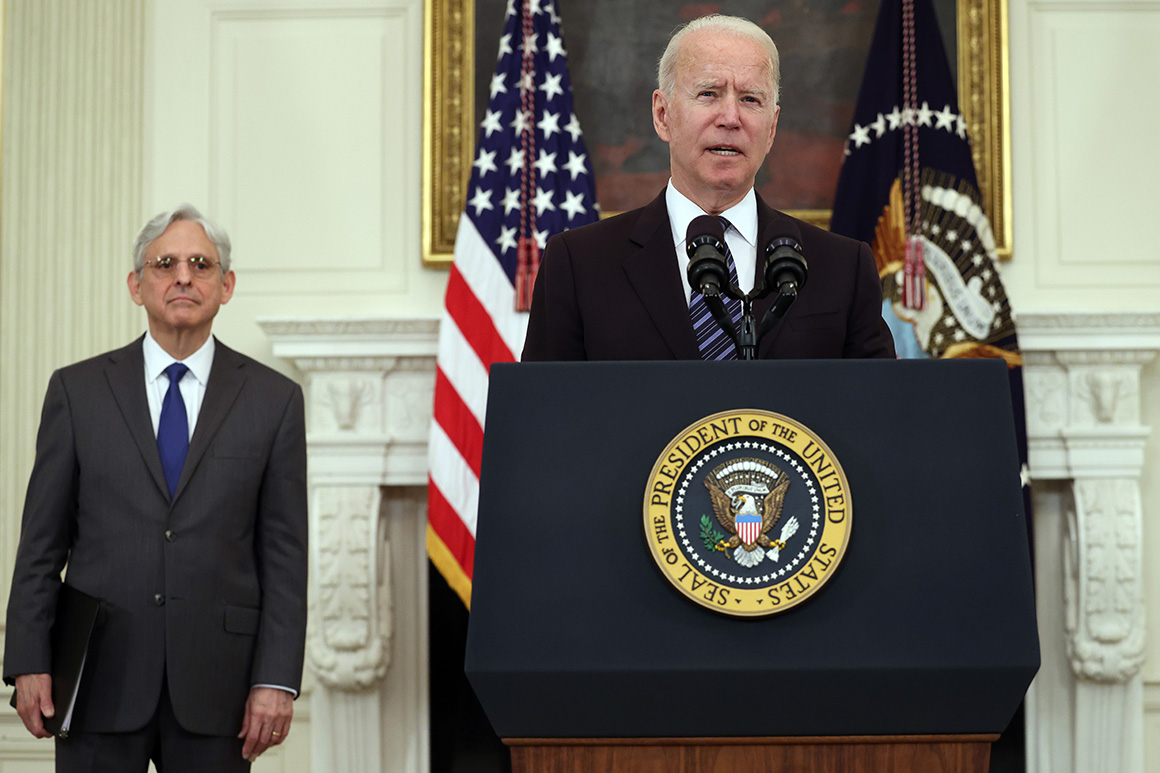
When the House select committee investigating the Jan. 6 insurrection starts its much-anticipated public hearings next week, President Joe Biden and his staff will be consuming it like most Americans — by quietly watching snippets on TV.
Biden and his aides are carefully keeping their distance from the committee’s work, commenting rarely, if ever, on the revelations that have come as the House panel pieces together a timeline of events on Donald Trump’s knowledge and involvement in the plot to overturn the 2020 election. For the next public phase in that investigation, their posture won’t change.
Don’t expect insta-commentary from the White House briefing room when hearings start on June 9. Don’t hold your breath waiting for Biden to convey his shock and disappointments. Instead, a White House official said the plan is to add the president’s voice only when appropriate, and that usually means in emphasizing the importance of protecting democracy and holding accountable those who would seek to undermine or destroy it.
Biden’s arms-length approach is driven by concern that injecting political messaging into an ongoing, bipartisan investigation could complicate possible law enforcement actions or additional criminal investigations that might stem from the committee’s work, according to a person familiar with the White House’s thinking. The fear inside the White House is that if Biden appears to be influencing the committee or the Justice Department, it would unnecessarily give Trump and his allies more fodder as they try to delegitimize the findings.
Though the president has increasingly used a contrast with Trump to frame the stakes of the midterm elections, White House aides believe the president’s voice shouldn’t be used to provide running commentary on day-to-day procedural developments in the investigation.
For now, most Democrats, pollsters, and election security experts think it’s wise for Biden to maintain his distance from the proceedings. Once the hearings are finished and the findings are laid out, they say, Biden would be wise to forcefully lay out to the public the evidence of continued attempts to undermine and subvert the country’s elections.
“For the president to inject himself into it would unnecessarily politicize the issue,” said House Majority Whip Jim Clyburn (D-S.C.). “It’s better for him to keep distance between himself and those hearings.”
One factor that will guide how Biden reacts to any particulars of the hearings is a desire to avoid even the appearance of applying pressure on Attorney General Merrick Garland. The evidence presented and testimony given could impact how aggressively Garland looks into Trump and his inner circle’s connections to the insurrection and other attempts to subvert the 2020 vote count.
“Biden's instincts will be to — as the campaign begins for November — help unpack the story for the American people, but in a way that doesn't indicate that they are trying to influence the law enforcement decisions that Garland and his team need to make,” said John Podesta, Bill Clinton’s former White House chief of staff. “Once the hearings are done, the story is told, the information’s unpacked, then there is a role as the president is framing a choice for the American people about what it means to empower the people who rooted on the insurrection versus keeping people in power who respect the Constitution.”

Still, the White House will have work to do. The president’s research team will likely be tasked with monitoring the hearings and updating senior staff. During major hearings, Biden's schedule doesn’t stop, but he’ll usually watch clips when he has a break in the day, sometimes catching live proceedings.
The White House legislative affairs team will be in close contact with both Speaker Nancy Pelosi’s office and senior staff on the Jan. 6 select committee as it monitors the hearings, said a second White House official.
The White House could also call an audible, should aides decide any major revelations from the committee warrant a response from staff or the president. One former administration official said if Republicans in Congress mount a coordinated nothing-to-see-here campaign, the White House would “make a decision to be more vocal.”
Biden has been vocal before. He forcefully condemned the violent attack on the Capitol and the Republicans who helped incite and potentially coordinate it.
On the anniversary of the insurrection in January, Biden said he would not shrink from the moment. “I will stand in this breach. I will defend this nation. I will allow no one to place a dagger at the throat of democracy,” he said in an address to the country. But since his January speeches — one in the Capitol’s Statuary Hall, the other in Georgia — he has only spoken out sporadically.
“Biden gave a couple of really good speeches about the threat to democracy [but] he hasn't consistently hammered home the threat,” said Rick Hasen, elections law expert and University of California, Irvine professor. “As a matter of policy, this should be at the top of the list because our democracy is under serious threat.”
Among Democrats and their allies, there has been continuous debate over how critical a focus on Jan. 6 and the accompanying threats to democracy will prove to the party’s midterm prospects.
In a focus group conducted by a Democratic firm in May of white Democratic-leaning voters who voted in 2020 but not in 2016, the voters appeared acutely interested in and motivated by what they see as continued efforts by Republicans to undermine future elections.
“I cannot wait for the public hearings from the Jan. 6 committee,” said one woman from Ohio.
Celinda Lake, a veteran Democratic pollster who advised Biden during his 2020 campaign, said the Jan. 6 committee hearings have the “ability to be both persuasive to independents and mobilize Democrats.”
“People are very interested in hearing about it, particularly Democrats because they believe it could happen again,” said Lake. “They don't think this is an isolated incident. They think it was planned.”
Sarah Longwell, a Never-Trump Republican strategist, said she has found similar results in her own focus groups.
“Democratic voters and then left leaning independents want, whether it’s Biden or the Democrats in general, to be able to prosecute the case against Republicans,” said Longwell. “There's a difference between Biden applying pressure to Garland… versus Biden using the bully pulpit to draw a stark contrast and clearly articulate the threat that Republicans — who don't want to count votes, refused to certify elections — pose to democracy and the country.”
But despite these findings, there is not much expectation that Biden will change his otherwise cautious approach to the issue. The data, those familiar with the matter say, isn’t there yet.
“There's no political polls saying that's the thing to do,” the former administration official said. “That's not where any polling has ever said that's the direction to go in.”
----------------------------------------
By: Laura Barrón-López
Title: How Biden plans to handle the Jan. 6 hearings
Sourced From: www.politico.com/news/2022/06/05/biden-january-6-hearings-00037243
Published Date: Sun, 05 Jun 2022 06:00:00 EST
Did you miss our previous article...
https://consumernewsnetwork.com/politics-us/how-a-billionaire-mall-magnate-pulled-ahead-in-the-los-angeles-mayoral-race






